One of the rewards of working from home is being your own boss. This freedom comes with a price though: security.
It's not surprising why a lot of people are reluctant to jump into the band wagon of freelancers. The road to working from home is rife with risks and challenges.
It's not surprising why a lot of people are reluctant to jump into the band wagon of freelancers. The road to working from home is rife with risks and challenges.
Self-employment and freelancing would usually mean living project after project and working for a client who might no longer require your services one day.
The pay is as good as it gets, yet are you doing something to achieve security over the long term?
A prudent agent gave me a planner a year ago. As I browsed through the pages, I realized that of the many gift ideas for freelancers, the most practical would be financial security.
The pay is as good as it gets, yet are you doing something to achieve security over the long term?
A prudent agent gave me a planner a year ago. As I browsed through the pages, I realized that of the many gift ideas for freelancers, the most practical would be financial security.
Financial Planning for Freelancers
The financially wise insist that if you want to boon yourself with security and monetary stability, you should start as early as possible. When freelancing:
- Remember to save. A good buffer would be an accumulated savings equivalent to 6 to 12 months of your earnings. This is a good amount to cover for short-term and immediate needs. You can easily withdraw and use your savings as needed.
Savings represent the net amount when you deduct your total expenses from your total income. If you're getting negative figures, then consider how you can raise your earnings and minimize your expenditures.
- Acquire assets. Considering the very low interest rates of banks, it will be unwise to put all of your earnings into your savings account. Filipino freelancers must keep in mind that only up to P500,000 is covered by the Philippine Deposit Insurance Corporation. Filing the necessary paperwork and claiming the money in case your bank goes bankrupt could take you years.
This is why it's wise to purchase assets from your excess savings. Assets take the form of time deposits, properties, insurance coverage and plans. They function as safety nets over the long term and are convertible to cash. Assets assure you that you have enough funds to cover major expenses in the future.
- Invest. While savings help you to stay liquid and assets keep your funds secure for future use, investments allow you to move your money. Depending on how you play it, you can either make your money grow or lose it. The risk is always proportional to the reward.
Investing is ideally equated to profit-making or enabling you make more money from your money. This can take the form of higher education, stocks and bonds. Unfortunately, with so much emphasis placed on budgeting to cover for day-to-day living, very few people have the means to acquire assets and make investments.
Reviewing Spending Patterns and Saving Habits
To get started on the path of financial security, be ready to review your spending patterns and saving habits. I have begun my journey by deciding to spend less on vanity splurges and to be more serious about my financial security. Below is a preview of my not-so-perfect spending and saving behavior:
- Teecup's Spending Patterns
- I get motivated to earn so I can spend money to travel.
- I tend to get insanely attracted to pumps with stiletto heels.
- I love good food and would indulge in food trips.
- I splurge on hair care and facial care.
- I end up buying canned and ready-to-eat food to avoid cooking.
- Teecup's Saving Habits
- I set aside savings first instead of waiting for what's left after expenses.
- I believe time deposits are a necessary evil and so are banks.
- I always go for bank accounts bundled with free insurance.
- I self-impose a minimum amount that I would not touch - by hook or by crook.
- I hoard shiny coins and crispy bills.
- Teecup's Recent Financial Moves
- I got a life plan from St. Peter's. My plan offers a complete money-back guarantee 15 years after full payment. The plan is transferable and covers coffin and memorial services. It also entitles my named beneficiaries to receive cash. Annual cost for 5 years: P7,000.
- I secured a life insurance plan from Insular Life. Apart from being a regular life insurance, the policy entitles me to secure loans at a tinsy winsy interest of 0.8 percent a month. I would have opted for PRU Life U.K. had I known earlier that it offers three times as much coverage as Insular Life. Annual cost for 10 years: P22,000.
For the practical writer and freelancer, financial security is not usually something that one receives as an instant gift from friends. You need to plan for it yourself or if you intend to sponsor a friend, you will have to get his cooperation and consent first. The procedures for enrolling funds on time deposit or getting a life plan require plenty of paperwork and documentation. What actions have you taken to secure your finances for the future?





